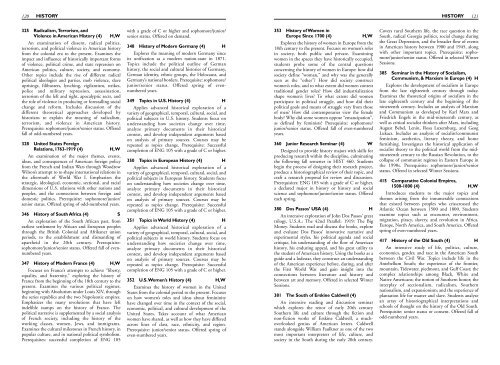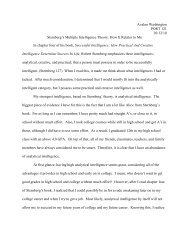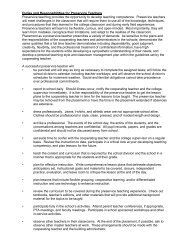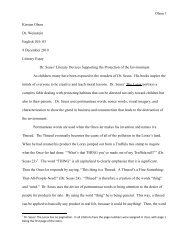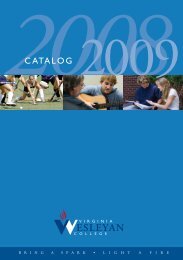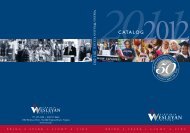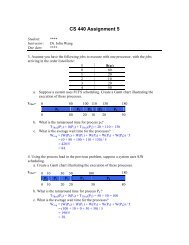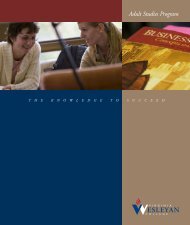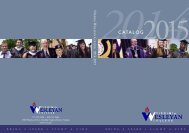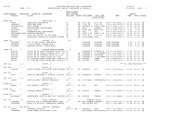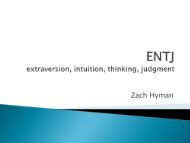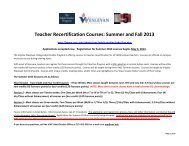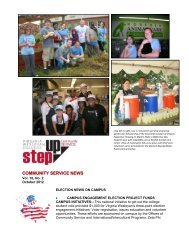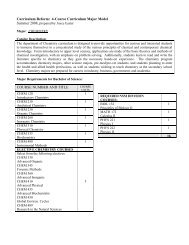2013-2014 Catalog - Virginia Wesleyan College
2013-2014 Catalog - Virginia Wesleyan College
2013-2014 Catalog - Virginia Wesleyan College
- No tags were found...
You also want an ePaper? Increase the reach of your titles
YUMPU automatically turns print PDFs into web optimized ePapers that Google loves.
120 HISTORYHISTORY121325 Radicalism, Terrorism, andViolence in American History (4) H,WAn examination of dissent, radical politics,terrorism, and political violence in American historyfrom the colonial era to the present. Examines theimpact and influence of historically important formsof violence, political crime, and state repression onAmerican politics, culture, society, and economy.Other topics include the rise of different radicalpolitical ideologies and parties, mob violence, slaveuprisings, filibusters, lynching, vigilantism, strikes,police and military repression, assassination,terrorism of the left and right, apocalyptic sects, andthe role of violence in producing or forestalling socialchange and reform. Includes discussion of thedifferent theoretical approaches developed byhistorians to explain the meaning of radicalism,terrorism, and violence in American history.Prerequisite: sophomore/junior/senior status. Offeredfall of odd-numbered years.328 United States ForeignRelations, 1763-1919 (4)H,WAn examination of the major themes, events,ideas, and consequences of American foreign policyfrom the French and Indian Wars through WoodrowWilson’s attempt to re-shape international relations inthe aftermath of World War I. Emphasizes thestrategic, ideological, economic, sectional, and racialdimensions of U.S. relations with other nations andpeoples, and the connections between foreign anddomestic politics. Prerequisite: sophomore/junior/senior status. Offered spring of odd-numbered years.346 History of South Africa (4) SAn exploration of the South African past, fromearliest settlement by African and European peoplesthrough the British Colonial and Afrikaner unionperiods, to the establishment and dismantling ofapartheid in the 20th century. Prerequisite:sophomore/junior/senior status. Offered fall of evennumberedyears.347 History of Modern France (4) H,WFocuses on France’s attempts to achieve “liberty,equality, and fraternity,” exploring the history ofFrance from the beginning of the 18th century to thepresent. Examines the various political regimes,beginning with Absolutism under Louis XIV, throughthe series republics and the two Napoleonic empires.Emphasizes the many revolutions that have leftindelible stamps on the history of France. Thepolitical narrative is supplemented by a social analysisof French society, including the history of theworking classes, women, Jews, and immigrants.Examines the cultural milestones in French history, inpopular culture, and in national political symbolism.Prerequisites: successful completion of ENG 105with a grade of C or higher and sophomore/junior/senior status. Offered on demand.348 History of Modern Germany (4) HExplores the meaning of modern Germany sinceits unification as a modern nation-state in 1871.Topics include the political outline of Germanhistory, the social and cultural histories of Germany,German identity, ethnic groups, the Holocaust, andGermany’s national borders. Prerequisite: sophomore/junior/senior status. Offered spring of evennumberedyears.349 Topics in U.S. History (4) HApplies advanced historical exploration of avariety of geographical, temporal, cultural, social, andpolitical subjects in U.S. history. Students focus onunderstanding how societies change over time,analyze primary documents in their historicalcontext, and develop independent arguments basedon analysis of primary sources. Courses may berepeated as topics change. Prerequisite: Successfulcompletion of ENG 105 with a grade of C or higher.350 Topics in European History (4) HApplies advanced historical exploration of avariety of geographical, temporal, cultural, social, andpolitical subjects in European history. Students focuson understanding how societies change over time,analyze primary documents in their historicalcontext, and develop independent arguments basedon analysis of primary sources. Courses may berepeated as topics change. Prerequisite: Successfulcompletion of ENG 105 with a grade of C or higher.351 Topics in World History (4) HApplies advanced historical exploration of avariety of geographical, temporal, cultural, social, andpolitical subjects in world history. Students focus onunderstanding how societies change over time,analyze primary documents in their historicalcontext, and develop independent arguments basedon analysis of primary sources. Courses may berepeated as topics change. Prerequisite: Successfulcompletion of ENG 105 with a grade of C or higher.352 U.S.Women’s History (4) H,WExamines the history of women in the UnitedStates from the colonial period to the present. Focuseson how women’s roles and ideas about femininityhave changed over time in the context of the social,economic, political, and cultural development of theUnited States. Takes account of what Americanwomen have shared, as well as how they have differedacross lines of class, race, ethnicity, and region.Prerequisite: junior/senior status. Offered spring ofeven-numbered years.353 History of Women inEurope Since 1700 (4)H,WExplores the history of women in Europe from the18th century to the present. Focuses on women’s rolesin society, both public and private. Examiningwomen in the spaces they have historically occupied,students probe some of the central questionsconcerning the history of women in Europe: how didsociety define “woman,” and why was she generallyseen as the “other”? How did society constructwomen’s roles, and to what extent did women contesttraditional gender roles? How did industrializationshape women’s lives? To what extent did womenparticipate in political struggle, and how did theirpolitical goals and means of struggle vary from thoseof men? How did contemporaries view the femalebody? Why did some women oppose “emancipation”,as defined by feminists? Prerequisite: sophomore/junior/senior status. Offered fall of even-numberedyears.360 Junior Research Seminar (4) WDesigned to provide history majors with skills forproducing research within the discipline, culminatingthe following fall semester in HIST 460. Studentsbegin the process of designing their research project,produce a historiographical review of their topic, andcraft a research proposal for review and discussion.Prerequisites: ENG 105 with a grade of C or higher,a declared major in history or history and socialscience and sophomore/junior/senior status. Offeredeach spring.380 Dos Passos’ USA (4) HAn intensive exploration of John Dos Passos’ greattrilogy, U.S.A.: The 42nd Parallel: 1919: The BigMoney. Students read and discuss the books, exploreand evaluate Dos Passos’ innovative narrative andexperimental styles, his political agenda and socialcritique, his understanding of the flow of Americanhistory, his enduring appeal, and his great utility tothe student of American history. Using the books as aguide and a lodestar, they construct an understandingof the American experience before, during, and afterthe First World War and gain insight into theconnections between literature and history andbetween art and memory. Offered in selected WinterSessions.381 The South of Erskine Caldwell (4)An intensive reading and discussion seminarwhich explores the tenor of early 20th centurySouthern life and culture through the fiction andnon-fiction works of Erskine Caldwell, a muchoverlookedgenius of American letters. Caldwellstands alongside William Faulkner as one of the twomost important interpreters of life, culture, andsociety in the South during the early 20th century.Covers rural Southern life, the race question in theSouth, radical Georgia politics, social change duringthe Great Depression, and the broader flow of eventsin American history between 1900 and 1945, alongwith other important topics. Prerequisite: sophomore/junior/seniorstatus. Offered in selected WinterSessions.385 Seminar in the History of Socialism,Communism, & Marxism in Europe (4) HExplores the development of socialism in Europefrom the late eighteenth century through today.Examines the theoretical origins of socialism in thelate eighteenth century and the beginning of thenineteenth century. Includes an analysis of Marxismand Communism as developed by Karl Marx andFriedrich Engels in the mid-nineteenth century, aswell as critical socialist thinkers after Marx, includingAugust Bebel, Lenin, Rosa Luxemburg, and GeogLukacs. Includes an analysis of socialist/communistfeminism, aesthetics, literary theory, and homefurnishing. Investigates the historical application ofsocialist theory to the political world from the midnineteenthcentury to the Russian Revolution, to thecollapse of communist regimes in Eastern Europe inthe 1990s. Prerequisite: sophomore/junior/seniorstatus. Offered in selected Winter Sessions.415 Comparative Colonial Empires,1500-1800 (4) H,WIntroduces students to the major topics andthemes arising from the innumerable connectionsthat existed between peoples who crisscrossed theAtlantic Ocean between 1500 and 1800. Studentsexamine topics such as encounter, environment,migration, piracy, slavery, and revolution in Africa,Europe, North America, and South America. Offeredspring of even-numbered years.417 History of the Old South (4) HAn intensive study of life, politics, culture,economics, gender, and race in the American Southbetween the Civil War. Topics include life in theAntebellum South; the experience of the frontier,mountain, Tidewater, piedmont, and Gulf Coast; thecomplex relationships among Black, White andNative Americans; the notion of Southern honor; theinterplay of sectionalism, radicalism, Southernnationalism, and expansionism; and the experience ofplantation life for master and slave. Students analyzean array of historiographical interpretations andschools of thought on the history of the Old South.Prerequisite: senior status or consent. Offered fall ofodd-numbered years.


